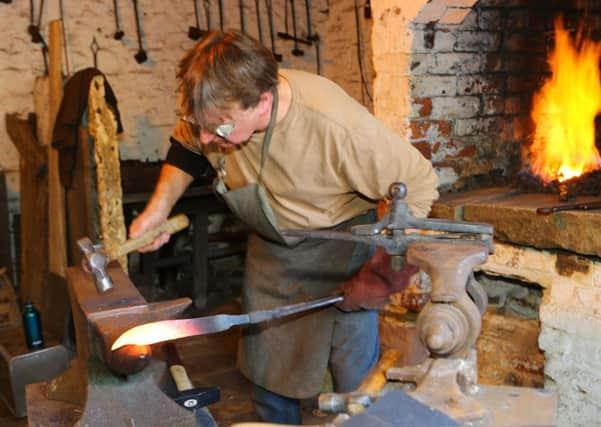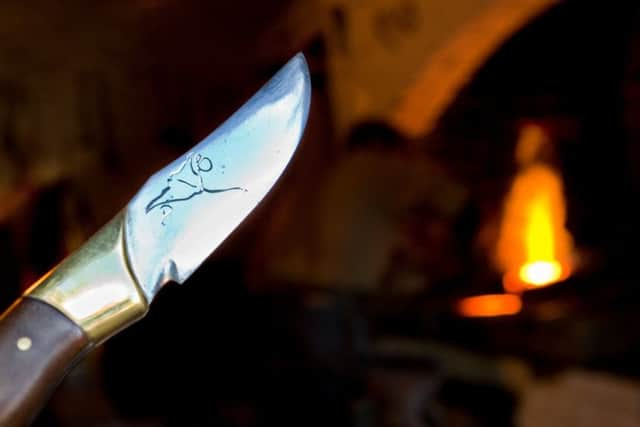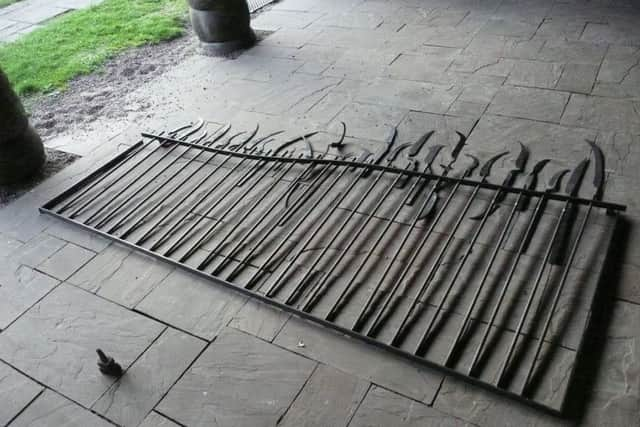Heritage: A work of art being forged from skills of metalworkers


A big new metalworking project to illustrate the history of Abbeydale Industrial Hamlet should soon be in place to make the first view of the site more attractive to visitors.
Knife-maker and metalworker Duncan Edwards is currently working on a new set of metal railings for the perimeter of the industrial museum on Abbeydale Road.


Advertisement
Hide AdAdvertisement
Hide AdDuncan said that a recent blacksmithing event held at Abbeydale Industrial Hamlet was a follow-up to the Galvanize festival celebration of Sheffield’s metal trades that he helped to run.
A group of more than 30 blacksmiths from all over the country descended on Sheffield to display their skills and let members of the public have a go at forging, so Duncan came up with the idea of getting them all to contribute a piece of work to his railings project.
He said: “I’m making the railings as part of a three-piece project for the entrance there. I wanted it to demonstrate their skills and be a feature for the place.
“As you go down Abbeydale Road, you could miss the industrial hamlet.


Advertisement
Hide AdAdvertisement
Hide Ad“I thought I could design and make the structure and ask the blacksmiths if they could forge finials for the top of it.”
The idea was for the blacksmiths to make pieces that represent the history of the site, which began life in the 18th century as Abbeydale Works, one of the biggest water-powered steelworking sites on the River Sheaf.
It manufactured crown scythes, forged under tilt hammers, and patent riveted scythes, plus other agricultural edge tools such as grass hooks and hay knives.
Some of the blacksmiths’ designs are replicas of the scythes and tools that their predecessors would have manufactured there.


Advertisement
Hide AdAdvertisement
Hide AdDuncan said: “A lot are young blacksmiths, they’re not all older guys. They have an opportunity to display their work for the first time.
“There are 26 pieces in all and we’ve got one or two pieces that children forged at the festival. We’ll try to work them in.”
Duncan also has plans to make a huge entrance piece for the site, featuring a tilt hammer, if he can get funding for it.
The blacksmiths he works with are members of the British Artist Blacksmiths Association and the Abbeydale weekend has become one of their annual events.


Advertisement
Hide AdAdvertisement
Hide AdTheir skills are not dying out, unlike a lot of traditional craft trades once commonplace in Sheffield.
Duncan said: “A lot of the people have only just graduated from the Herefordshire and Ludlow College.
“It’s the only course in the country.
“When they were here, it made Abbeydale come alive. It was very close to what the site would have looked like when it was working.”
The railings project should be completed by August, when Duncan has finished soldering all the pieces in place.
Advertisement
Hide AdAdvertisement
Hide AdHe created the beautiful gates at Kelham Island Museum, where he works as an engineer, that show the city skyline and wildlife on the island.
Duncan is a jack of all metalworking trades.
His work at Kelham Island includes keeping the mighty River Don engine going and also teaches courses around the country in making silver spoons.
His beautiful pocket knives are collector’s items.
Duncan learned his silversmithing and jewellery-making skills at college in Psalter Lane.
However, crafting beautiful pieces over many months didn’t leave him with many marketable skills, so he went off to learn a more practical trade.
Advertisement
Hide AdAdvertisement
Hide AdHe said: “I originally worked for a silversmith’s, Roberts & Belk. When it went to the wall, I set up on my own. I tried to work out how I could use these skills and find work.
“I did all sorts, including working for an antiques company on Portobello Road in London, repairing silver.”
One strange job involved casting the then new Sheffield Lib Dem MP Nick Clegg’s hand in pewter when he worked with students with complex learning difficulties at Freeman College, Sheffield.
Some of his silversmithing work for Roberts & Belk was even more off the wall, though, including creating a special royal wedding dinner service for the Doha palace in Kuwait that included 12 gigantic serving dishes made to look like baby camels.
Advertisement
Hide AdAdvertisement
Hide AdThey had to adapt a Saab car press in order to make them, he said.
More recently, he made a branding iron as a prop for a local theatre group.
Duncan can be seen at work at Abbeydale on an old scythe riveting forge that he has had to restore to its original condition in order to work on it.
He is currently restoring a hand-driven bellows.
He is guided by studying early line drawings made of the site when it was working that are now part of Sheffield Archives.
He said of his busy working life: “It’s a seven-day week job but I enjoy it!”